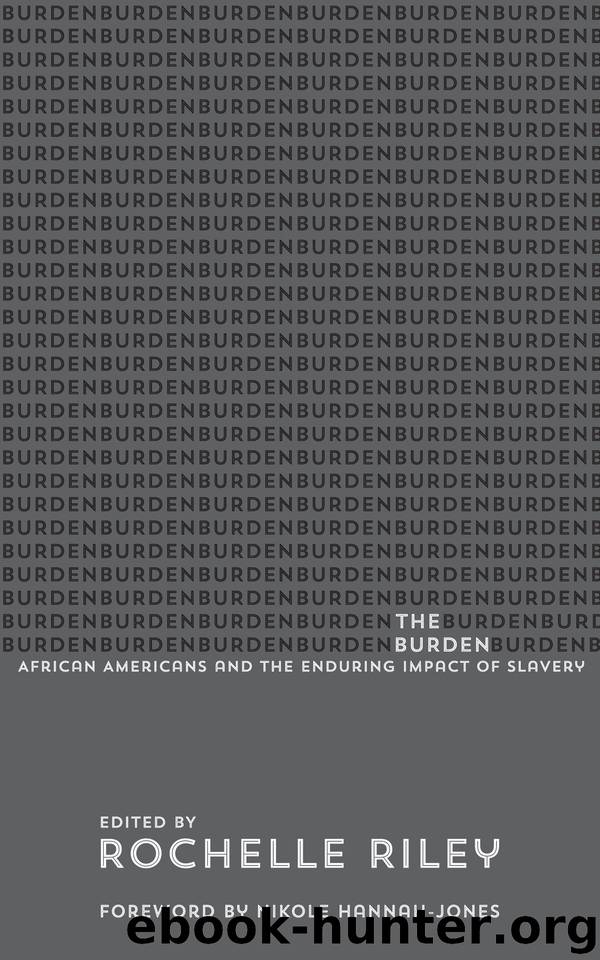The Burden by Rochelle Riley

Author:Rochelle Riley
Language: eng
Format: epub
Publisher: Wayne State University Press
OBJECT LESSONS
RE-ENCOUNTERING SLAVERY THROUGH ROSE’S GIFT
Mark Auslander
As a teacher and museum director, I often struggle with how to convey the unimaginable horror of chattel slavery to my students and museum visitors. Statistics alone seem incapable of moving people. In our image-saturated world, graphic or cinematic representations of slave ships and plantation outrages, while necessary, increasingly seem insufficient. We have become so accustomed to mass media scenes of horror and subjection that we too easily turn our eyes away. Or simply turn the channel.
In his famous eulogy for the victims of the 9/11 terrorist attacks, Rabbi Marc Gellman stated (at a time when it was incorrectly believed that six thousand people had perished at the World Trade Center, at the Pentagon and on United Flight 93): “On that day six thousand people did not die. On that day one person died, six thousand times.”
That simple, profound restatement compels us, in the most visceral way possible, to face directly the irreducible humanity of each and every victim of injustice. How, I have often wondered, can that startling sense of moral immediacy be conveyed in the vast shadows of the slave trade and of the slavery system, shadows that continue to haunt us to this day?
At its heart, the question facing us is how do we teach and promote empathy at a historical moment when waves of intolerance and ethnic nationalism are once more sweeping the globe? How do we come to see the self in the other, to resist the urge to turn our eyes away from the suffering of our fellow human beings, past and present? How, in effect, do we relocate ourselves into the predicament of a person who is not, at first glance, linked to us in any way?
Child psychologists tell us that children learn the vital capacity for empathy, in part, through engaging with physical objects. A toddler’s blanket, doll, or teddy bear hovers ambiguously between the child’s inner psychic universe and external objective reality. Under conditions of healthy development, these “transitional objects,” as the great psychoanalyst D.W. Winnicott termed them, allow the child to glimpse, gradually and in fits and starts, what it really might be like to inhabit another’s skin, to experience pleasure and pain within another person’s life horizons. A single inanimate physical thing, paradoxically, can help a child understand the suffering and joys, the singular humanity, of other living beings.
So let’s explore how a single physical thing might come to function as a “transitional object” for a nation that remains, in so many ways, in deep denial about its own childhood. We so often risk forgetting our nation’s founding, original sin—the vast collective crime of enslavement, the casual buying and selling of human beings, and the shattering of untold thousands of families in the pursuit of vast financial profit.
In 2007, at a flea market in Tennessee, a white woman purchased for $20 a seeming pile of rags, which contained, to her great surprise, an old, patched cotton bag. That bag bore on its lower
Download
This site does not store any files on its server. We only index and link to content provided by other sites. Please contact the content providers to delete copyright contents if any and email us, we'll remove relevant links or contents immediately.
| Anthropology | Archaeology |
| Philosophy | Politics & Government |
| Social Sciences | Sociology |
| Women's Studies |
Nudge - Improving Decisions about Health, Wealth, and Happiness by Thaler Sunstein(7709)
The Fire Next Time by James Baldwin(5447)
iGen by Jean M. Twenge(5416)
Adulting by Kelly Williams Brown(4574)
The Sports Rules Book by Human Kinetics(4388)
The Hacking of the American Mind by Robert H. Lustig(4383)
The Ethical Slut by Janet W. Hardy(4253)
Captivate by Vanessa Van Edwards(3840)
Mummy Knew by Lisa James(3693)
In a Sunburned Country by Bill Bryson(3543)
The Worm at the Core by Sheldon Solomon(3487)
Ants Among Elephants by Sujatha Gidla(3467)
The 48 laws of power by Robert Greene & Joost Elffers(3293)
Suicide: A Study in Sociology by Emile Durkheim(3023)
The Slow Fix: Solve Problems, Work Smarter, and Live Better In a World Addicted to Speed by Carl Honore(3010)
The Tipping Point by Malcolm Gladwell(2925)
Humans of New York by Brandon Stanton(2873)
Get What's Yours for Medicare: Maximize Your Coverage, Minimize Your Costs by Philip Moeller(2739)
Handbook of Forensic Sociology and Psychology by Stephen J. Morewitz & Mark L. Goldstein(2705)
